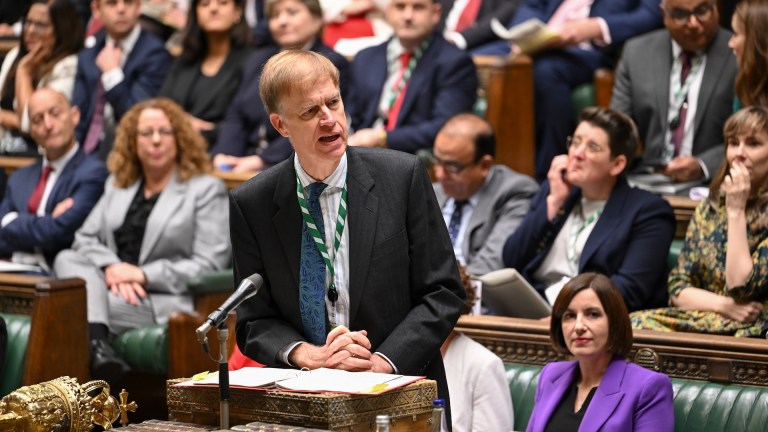It’s important to know about what support you could be entitled to. Below, we explain the expansion of 15 hours free childcare – including how to apply, whether there are enough nursery spaces and other financial help you can get if you’re not eligible.
Who gets 15 hours free childcare?
All children aged between three and four currently get at least 15 hours of free childcare each week, for 38 weeks of the year.
It is also already available to some two-year-olds from disadvantaged backgrounds. That includes if their parents are receiving qualifying benefits, they are looked after by a local authority or they have an education, health and care plan (EHCP).
In April 2024, the 15 hours free childcare scheme has been expanded to two-year-olds whose parents are working.
This will only apply to parents who individually work and earn the equivalent of 16 hours a week at the national minimum wage. Each parent can earn up to £100,000 and still be eligible.
From September 2024, 15 hours free childcare will be extended to working parents of children from the age of nine months to three years. From September 2025, eligible working parents with a child from nine-months-old up to school age will get 30 hours free.
Advertising helps fund Big Issue’s mission to end poverty
How does 15 hours free childcare work?
It’s available at participating early years settings, such as full day-care like nurseries and pre-schools, schools, childminders, after-school clubs, playgroups and Sure Start children’s centres.
These have to be ‘approved childcare’ providers, meaning they must be registered with Ofsted.
Usually, it’s 15 hours a week for 38 weeks of the year, but you might be able to take fewer hours over more weeks if your childcare provider allows it. It works out at 570 free hours per year.
The scheme doesn’t cover extra costs like meals, nappies or trips.
How to apply for 15 hours free childcare
Applications for 15 hours free childcare for children opened on 2 January, 2024. You can apply if your child is going to be two or older by the start of 31 August. This will mean you get free childcare from September 2024.
Then from 12 May, working parents of children aged between nine months and 23 months can apply for free childcare, which you’ll get from September 2024.
Advertising helps fund Big Issue’s mission to end poverty
Parents have to confirm that they are still eligible for the support every three months, so if you apply close to 12 May, you will need to renew their code prior to the offer starting in September.
You can apply by signing up to the government’s Childcare Choices website.
You’ll need to have your national insurance number, date you started work, details of any government support or benefits you receive, and your child’s birth certificate reference number. Some people find out if they are eligible straight away, while it can take up to seven days for others. Once your application is approved, you’ll get a code to give to your childcare provider.
When will my child get 30 hours free childcare?
Children aged between three and four are eligible for 30 hours of free childcare each week, as long as their parents are working.
To qualify as ‘working’, parents have to be earning at least £8,670 a year but less than £100,000 each.
By September 2025, children aged between nine months and school age will get 30 hours of free childcare per week (again, as long as their parents are working and within the salary threshold).
Advertising helps fund Big Issue’s mission to end poverty
Are there enough nursery spaces for the expansion of free childcare?
Campaigners have warned there are not enough nursery spaces to meet the increased demand for childcare expected following the expansion of free childcare.
The government claims it is investing over £400million in 2024-25 to increase the hourly rates paid to local authorities to help fund childcare.
From April, it is increasing the amount it pays providers to deliver childcare to an average of £11.22 per hour for under-twos, £8.28 for two-year-olds, and £5.88 for three and four-year-olds.
But there are fears this will not be enough for a sector which is “chronically overfunded”.
There is currently a recruitment and retention crisis in the early years sector – and it will get worse as the plans for childcare reform mean there will be increased demand for spaces. BBC analysis shows that an additional 100,000 children will require full time childcare over the next two years.
Around 57% of nursery and pre-school staff and 38% of childminders are considering quitting, research from the Early Education and Childcare Coalition has revealed.
Advertising helps fund Big Issue’s mission to end poverty
Pregnant then Screwed research with over 3,000 families eligible for the new funding for two-year-olds found that almost all have secured a place. Just 2% had not managed to do so. However, of those accessing childcare for the first time, this figure was six times higher.
This has prompted fears that there will not be enough spaces when childcare is expanded to younger children in September.
Even if children are eligible for free childcare, they might not be able to access it, especially if they are living in deprived areas of the country.
Research from the NEF shows that 1.5 million children live in “childcare deserts”, meaning there are more than three children for every childcare place. That is nearly half (44%) of all children and it is most common in deprived areas of the UK, where children stand to gain the most from quality early years education.
Labour has announced plans to create thousands of new nursery spaces in England to “ensure early education is available in every corner of our country for every family and every child”.
The Early Years Alliance welcomed plans to carry out a review but warned that the “priority should be ensuring that the whole sector is adequately funded, both today and in the future, and tackling the current staffing crisis as a matter of urgency”.
Advertising helps fund Big Issue’s mission to end poverty
What other government support is there for childcare?
One of the best ways to check affordable childcare options in your area is to visit your local council’s website. Council activity groups are quite often free or cheap. There might also be discounts if your child attends for a full week or subsidies for low-income families.
Many councils run the holiday activities and food programme to support low-income families over the school holidays. This is funded by the government and provides “healthy food and enriching activities” to children who are eligible for free school meals.
The government’s tax-free childcare scheme allows families to claim money back on childcare costs. For every £8 you spend on childcare, the government will pay you £2. You can receive up to £2,000 per child per year – that’s up to £500 every three months.
This can be used in term time or over the school holidays and covers childminders, nurseries, nannies, after school clubs and play schemes. It is offered to families with children under 11 – although once again, parents have to be earning at least £167 a week.
Families with disabled children get extra support through tax-free childcare. You can receive up to £1,000 every three months (up to £4,000 a year). You can also use it to help pay your childcare provider so they can get specialist equipment for your child such as mobility aids.
You can get tax-free childcare through the same application system as the 15 hours free childcare scheme.
Advertising helps fund Big Issue’s mission to end poverty
People on universal credit can claim back up to 85 per cent of their childcare costs. This only applies to people whose annual family income is less than £40,000, who are working (both must be working if you are a couple), and who pay for childcare such as holiday clubs.
Find out more, including about the 15 hours free childcare scheme, through the Childcare Choices website.
Get the latest news and insight into how the Big Issue magazine is made by signing up for the Inside Big Issue newsletter
Do you have a story to tell or opinions to share about this? We want to hear from you. Get in touch and tell us more.









